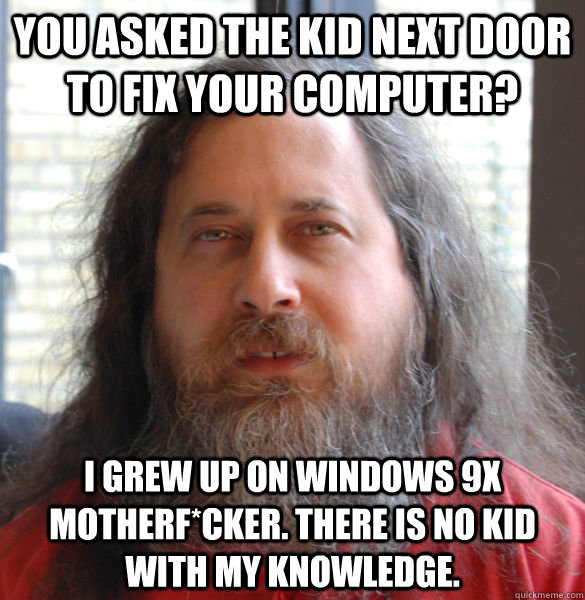Luddites & Laggards: Why We Suck At Tech Recruiting
 All you have to do is open an issue of Wired or ask your 13 year old how Google works to realize that, in fact, HR and recruiting aren't just behind the curve when it comes to technology adoption; they pretty much destroy the curve. In fact, for whatever reason, this industry and function are largely laggards of even the most casual consumer tech users.
All you have to do is open an issue of Wired or ask your 13 year old how Google works to realize that, in fact, HR and recruiting aren't just behind the curve when it comes to technology adoption; they pretty much destroy the curve. In fact, for whatever reason, this industry and function are largely laggards of even the most casual consumer tech users.
it's not that HR and recruiting professionals don't know how to use technology, and in most cases, they don't inherently fear or avoid it. In fact, many have their professional processes and daily workflow inexorably intertwined with inordinately complex, incredibly powerful enterprise grade systems.
Almost every HCM System, not to mention advanced functionality on mainstays like Excel, require an incredible amount of training, hands-on experience and countless calls to product support when performing anything but the most basic of functions.
Running a search in an on-premise version of SAP or Oracle makes coding on Ruby seem fairly simple by comparison, but, of course, getting that perspective requires a willingness to actually look at the bigger tech picture, something that, for some reason, too many HR & recruiting professionals seem loathe to do.
Instead of looking to stay on the cutting edge by actively identifying, experimentation or testing tools which might make their jobs easier, however, too many practitioners would rather rely on the same cumbersome system which, while familiar, actually hinder efficiency and efficacy and overall productivity.
On the one hand, the very high threshold for outdated, obsolete or onerous technology in HR is understandable; it not only gives the illusion of job security ("who else could figure this system out?") but also of job complexity. The specialized technical expertise and system experience required for simple tasks like sending benefits information or tracking vacation days seem to hide the secret every HR pro knows, but almost none will openly admit: their jobs are not only ridiculously easy (with some exceptions), but also largely superfluous.
Unfortunately, when you're also one of the primary arbiters of workforce planning and strategy, there are few incentives for retraining, redeveloping or redeploying obsolete, overpriced workers. Which is why recruiters are always the first ones to get fired, frankly, and also why third party recruiters and sourcers, whose professional livelihoods depend on actually putting up results instead of policing policy, seem further ahead of the tech adoption curve than almost any other HR function.
It's funny so much of the conversation around talent supply and demand centers around this erroneous idea of qualified tech candidates being some sort of critically endangered species that might not be around for much longer, and that employers should horde programmers the way Doomsday Preppers stock up on canned meat.
But there's no tech apocalypse on the horizon.
It's just that if you don't know anything about technology, then you have no way to know that your vendor, "influencers" or agency is more or less using this invented phenomenon of disappearing tech talent to create fear, which makes selling shitty software and specious services infinitely easier.
It's not that tech talent isn't out there, it's just that they don't want to be found by recruiters. If you're working with interesting tech, offer the chance to participate on innovative projects and have a good reputation on those parts of the internet recruiters don't even know exists (Silkroad ain't an HCM system to everyone), then good news is, tech talent will find you.
-
Comment by Keith D. Halperin on March 24, 2014 at 3:50pm
-
Thanks, Matt.
IMHO,
1) Complex HRIS/ATS, etc. systems are usually bought by those who don't have to use them day in and day out, without input from those of us who do. (HINT: Ask US what we need before you shove it on us.)
2) Most hiring managers want to hire people far better than they can reasonably expect to hire based on what they have to offer. However, if you aren't expecting "excellence on the cheap", you can usually get "very good or at least decent for what you can afford". OTOH, if you absolutely need far better than you can afford: you've pretty much ****** yourself through your own stupidity.
-kh
Comment
Subscribe
All the recruiting news you see here, delivered straight to your inbox.
Just enter your e-mail address below
RecruitingBlogs on Twitter
Groups
-
Recruiters On LinkedIn
1801 members
-
Corporate Recruiters
316 members
-
Recruiting tips for begi…
180 members
-
The Recruiting Bar
190 members
-
Recruiting Humor
222 members
-
News from the Recruiting…
34 members
-
Contractors Recruitment
62 members
-
Recruitment Process Outs…
194 members
-
Virtual Recruiters Netwo…
619 members
-
Independent Recruiters
530 members
© 2025 All Rights Reserved
Powered by
![]()
Badges | Report an Issue | Privacy Policy | Terms of Service
About
With over 100K strong in our network, RecruitingBlogs.com is part of the RecruitingDaily.com, LLC family of Recruiting and HR communities.
Our goal is to provide information that is meaningful. Without compromise, our community comes first.
Join the Network!
RecruitingDaily.com
One Reservoir Corporate Drive
4 Research Drive – Suite 402
Shelton, CT 06484
Email us: info@recruitingdaily.com

You need to be a member of RecruitingBlogs to add comments!
Join RecruitingBlogs